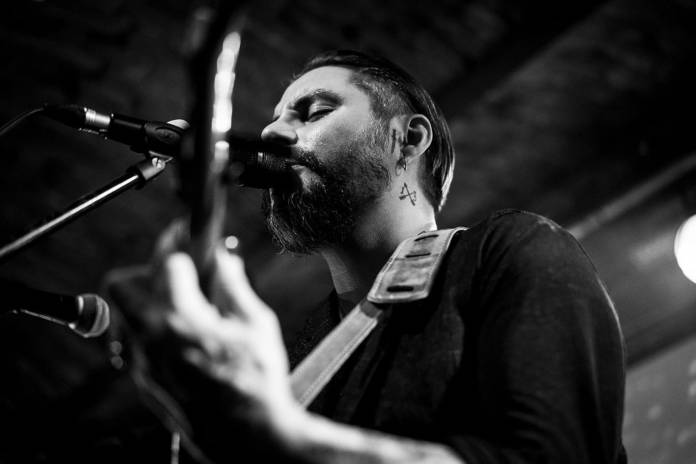“Home’s so far away,” goes the first line of Low Roar’s new record ross. Right now, that would mean Warsaw, where Low Roar mastermind Ryan Karazija resides as a home base for his regular tours around Europe. But before the long journey that took him to Poland through Iceland—with stops along the way for four full-length albums and several memorable musical appearances in the hit video game Death Stranding—Karazija was frontman of Audrye Sessions, the Oakland band that was a fixture of the Bay Area indie rock scene in the 2000s.
“It’s where I grew up, it’s where I spent a huge part of my life,” says the 37-year-old of the Bay Area. “But I don’t miss the cost of living, and I don’t think I would’ve ever ended up doing the project the way I’m doing it if I’d stuck around.”
Karazija was born in Santa Clara and raised in San Jose. He started playing guitar around age 15 or 16 and “somehow got into the singing part,” which seems like an awfully modest statement if you’ve heard his vocals. Audrye Sessions formed in 2002 and lasted until 2010, releasing an EP and an album and playing with fellow local indie rockers like Please Do Not Fight and Finish Ticket.
Low Roar released its first, self-titled record in 2011 after Karazija moved to Reykjavík to live with his now-ex-wife and her son. He recorded it at his kitchen table on his laptop with only minimal equipment, but Karazija was satisfied with the result, and it garnered strong reviews upon release.
“I never felt comfortable handing one of the Audrye Sessions CDs [to someone] and saying ‘this is mine’,” he says. “[Low Roar] was the first time when I felt like I was handing someone something I was proud of, and that’s happened with every single one of these records.”
Low Roar was compared incessantly to other acts who supposedly evoke the glacial sweep of Iceland—Sigur Rós, Múm, Björk, etc. Karazija bristles in interviews whenever the connection is made between his music and Iceland; he prefers his music, including ross., to be interpreted more subjectively.
“They have to go and listen to it and find out for themselves,” he says of his listeners. “Even I guess I don’t know what it’s about. It can be up to interpretation.”
What can be said for certain about ross. is that it’s his shortest album, just 42 minutes as opposed to the hour-plus monoliths of before, and boasts some of his more stripped-down arrangements. But it’s no less expansive than his prior three records, summoning walls of sound behind the gentle pitter-patter of a drum machine or the strum of an acoustic guitar.
Karazija’s voice is at once friendly and unearthly, inscrutable and intimate, in the vein of great indie-rock vocalists like Thom Yorke, Justin Vernon, Liz Harris, or, yes, Sigur Rós’s Jónsi. It’s striking music, the kind of thing that could stop you in your tracks at a record store—which is exactly what happened to Hideo Kojima.
During a stop in Reykjavík, the Japanese video-game auteur behind the Metal Gear Solid series heard Low Roar’s music while shopping for records. He knew right away he had the right music for his new project Death Stranding. 22 Low Roar songs were ultimately licensed for the game; “I’ll Keep Coming” was used in the baffling 2016 trailer Kojima revealed at the E3 gaming conference and is something of the game’s official theme song.
“[I got] a call from Sony, ‘we wanna use your music,’ they didn’t tell me what for,” says Karazija. “I didn’t hear about it until the trailer came out. I was watching a Warriors game with my mom and I started getting these text messages from my gamer friends. Next day I was driving down to L.A. to have dinner with [Kojima].”
Karazija wasn’t much aware of the scale of Death Stranding, which has been one of the most anticipated events in gaming for the last three years. The last system he owned was an Xbox he bought when he was 23, and he claims The Legend of Zelda: Ocarina of Time is the only video game he’s played through.
Actually playing Death Stranding is low on Karazija’s list of priorities, especially as he’s in the midst of a solo European tour. If new fans discover his music through the game, he welcomes them. After all, it gives people a reference point other than Iceland.







